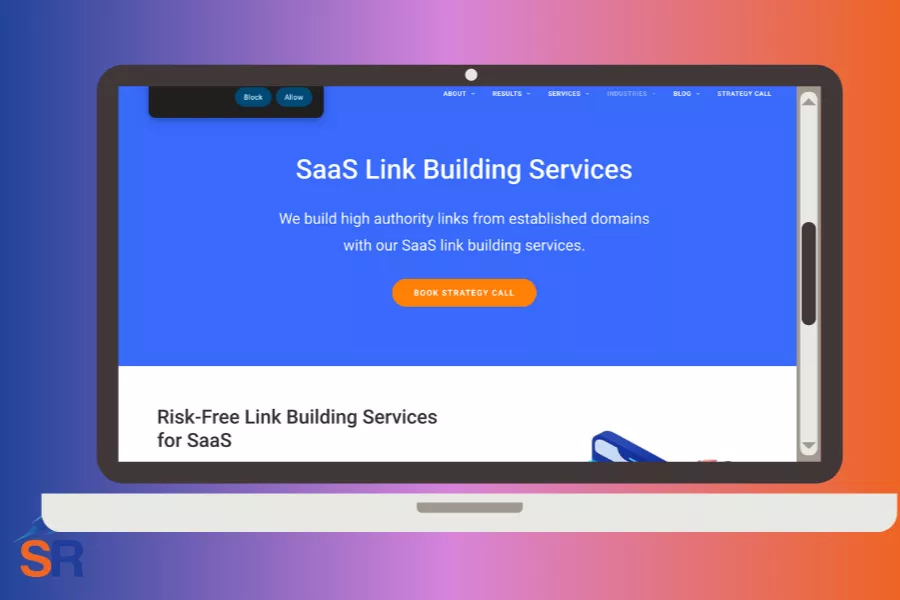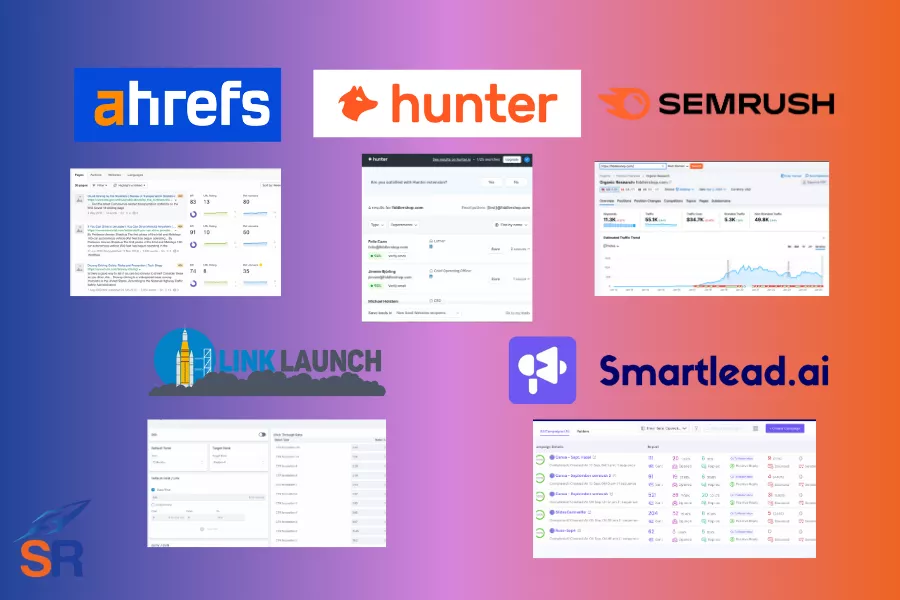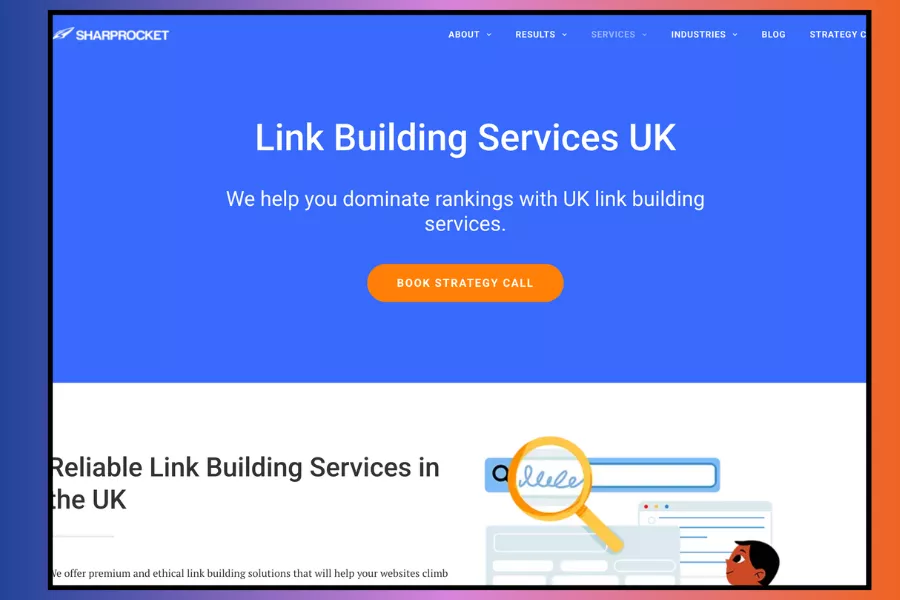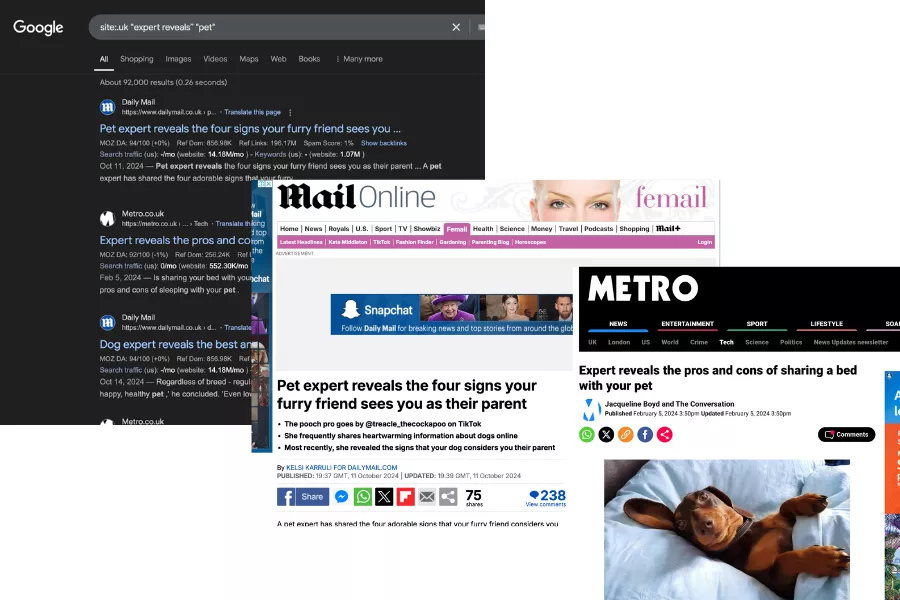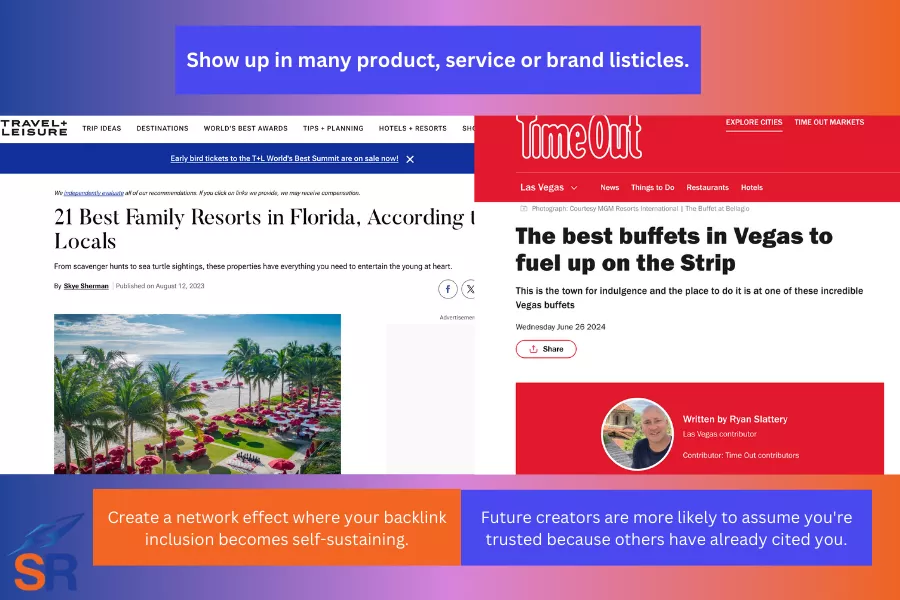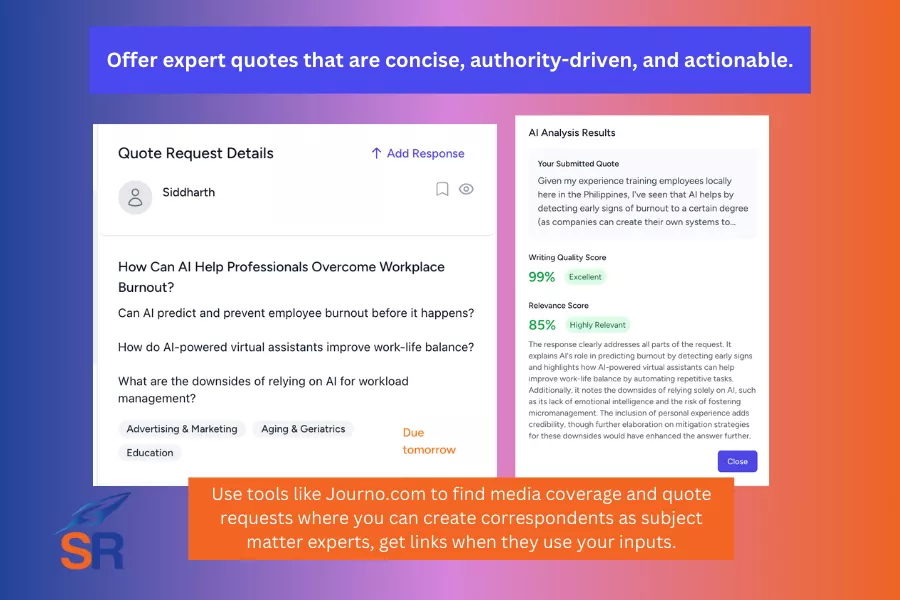Link building prospects approval is one of the overlooked aspects of link building, yet it is the determining factor that separates a successful link development campaign from mediocre ones.
Assessing backlinks based on quality, trustworthiness, and potential impact on website traffic and business objectives empowers your SEO campaign to achieve both its quick wins and long-term goals.
You could have thousands of link prospects, but without a strict quality control process, you’re likely to acquire irrelevant or low-value links that will not increase your site’s organic traffic.
Essential Criteria for Evaluating and Approving Link Building Prospects
The primary question, especially for SEO beginners, is, “What should I consider when evaluating backlink prospects?”
The quick answer to this: topical relevance, quality of the site’s backlink profile, engagement, and targeted traffic sources.
James Norquay has shared a recent experience of one of the backlinks acquired by an SEO agency to a client.
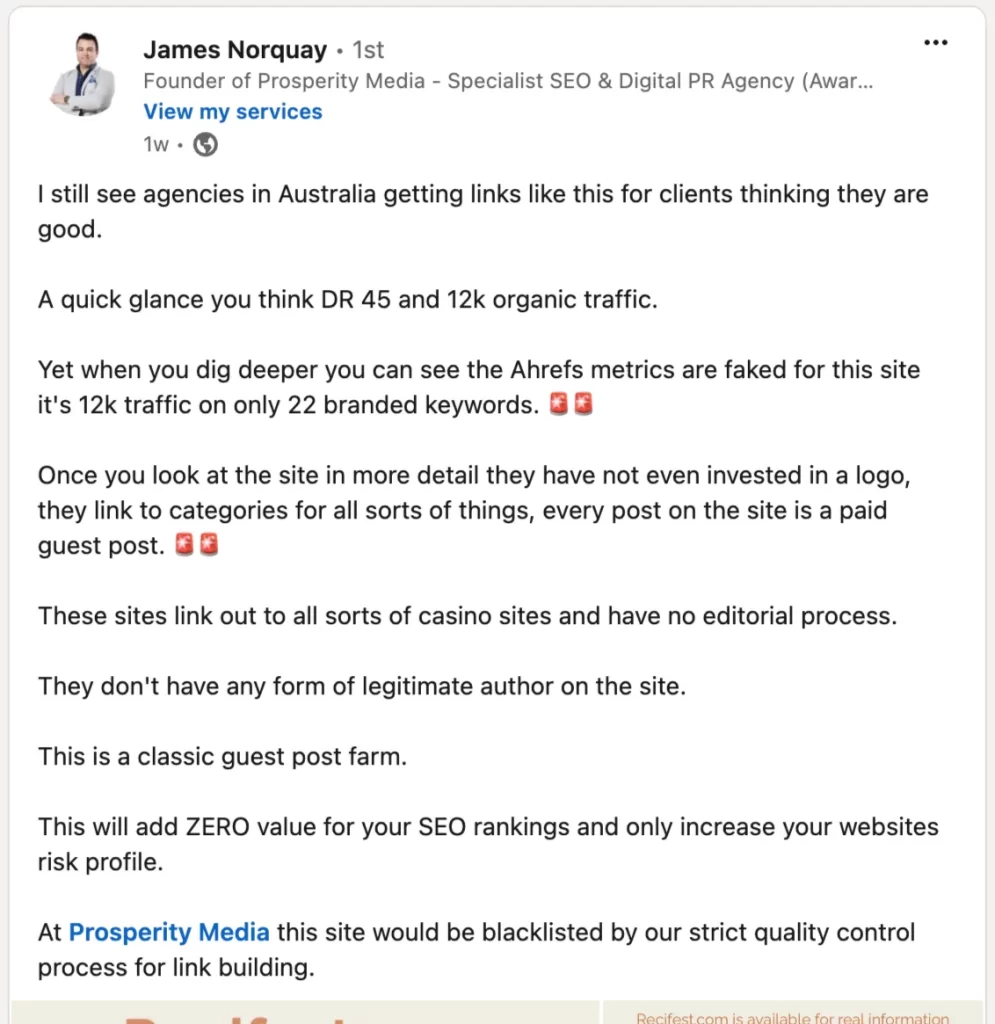
Those examples (and types of links) will not improve the client’s SEO rankings and could risk the site’s link profile.
Our link building agency has a simplified yet strict backlink qualification process. We do it pretty much manually (with the help of a few link analysis tools to quickly determine either the page or site authority score).
Link qualification will vary from industry to industry, the content assets available and their context. But essentially, these criteria are a solid list of control measures.
Site Legitimacy and Branding
When assessing backlink prospects, it is crucial to examine the site’s legitimacy and branding. A quick review of the website’s visible elements—such as its design, logo, social media profiles, About Us page, and Contact details—provides clues to whether an established entity genuinely owns the website.
Another way to confirm the site’s legitimacy is to check its blog author or contributors page, legal disclaimers, and history of consistent content production. These indicate a serious established presence in its niche.
For some instances, you can run the main author picture in Google Reverse Image search to see if the images used have been downloaded from stock photo websites.
Topical Relevance
Topical relevance in the scope of the target customer base is an essential factor in link building decisions.
Make sure the site’s content aligns with the industry or niche to ensure that the links obtained will be contextually appropriate.
Fact to tell that Google’s algorithms reward relevant links, so make it a top priority to choose sites whose topics closely relate to your own. Review their blog posts, product pages, and overall theme to verify that they consistently cover topics that naturally link to your website.
Quality of Website’s Backlink Profile
Evaluating the quality of the website’s backlink profile provides insights into its authority and trustworthiness. Link analysis tools like Ahrefs and Moz can help assess the strength and diversity of a site’s backlinks.
Check for anchor text usage, especially if it is mostly natural or branded, to avoid sites involved in link farms. You can check 3 to 5 recent articles or blog posts and click on some internal and external links.
Avoid sites that primarily link to spammy, unnatural, low-quality sources or from high-risk niches like casino (unless you operate in those verticals), as these can negatively impact your site’s SEO efforts. Instead, focus on prospects with a strong, reputable backlink profile that reflects credibility and authority within the domain.
You can filter links based on the default Ahrefs’ Best by Links feature—dofollow, in content, DR30+, and Traffic of 500+ (or customize based on your link benchmarks).
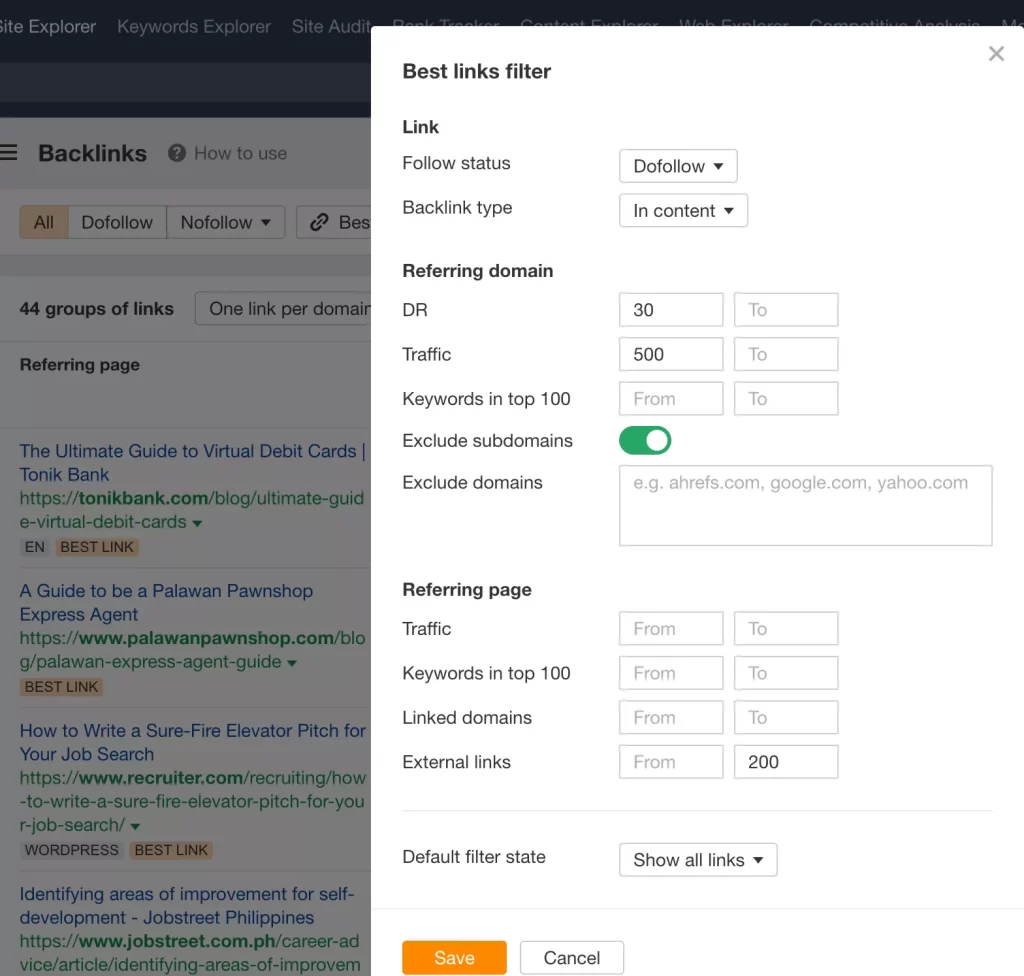
Targeted Traffic Sources
Understanding where the site’s traffic comes from can help you determine whether you’re likely to get additional value in the form of referral traffic as you acquire the link.
If you’re trying to rank for search results within the APAC region, evaluate domains if the traffic primarily comes from related countries such as Singapore or the Philippines.
A well-targeted site will have a steady flow of traffic from search engines, and relevant sources are more likely to drive qualified visitors to your site when the link is placed.
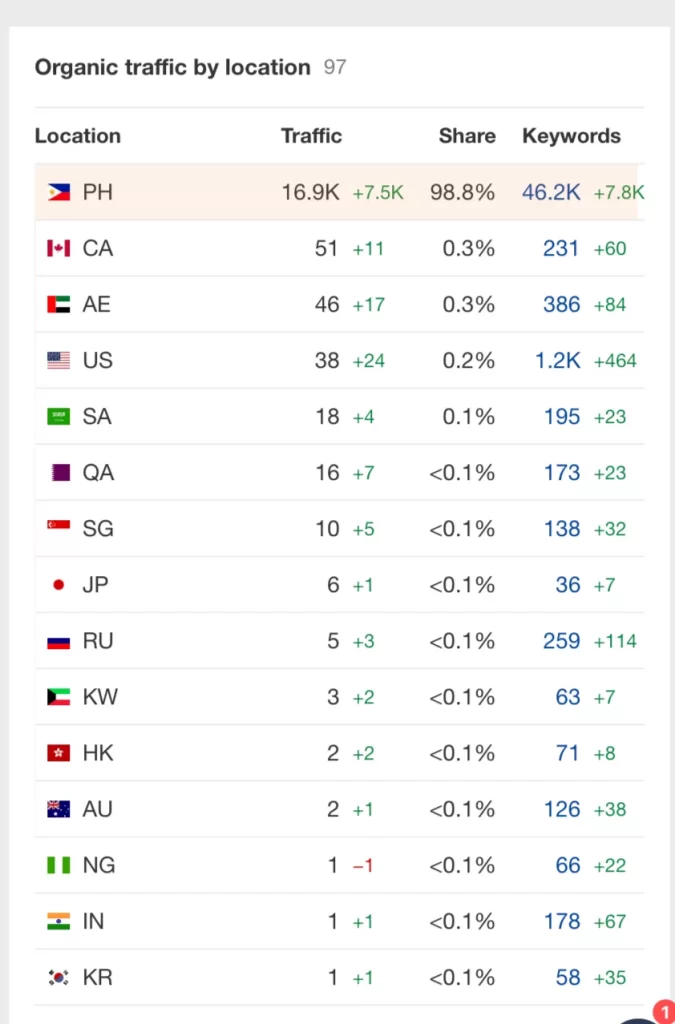
See the traffic graph if pages dropped in traffic—it could indicate that the site got hit by penalties. While a few sites recovered in the recent Core Update, most domains didn’t have the expected light of the day, so double-check for any traffic drop.
Prioritize sites with targeted traffic that aligns well with your audience, as it can boost the chances of gaining relevant referral traffic.
Optimization Tips to Improve Link Building Prospects Approval
Having a diverse set of link building clients allows us to optimize our process to get more approved prospects. By working with different industries and brands, like our SaaS client with strict guidelines or an eCommerce brand targeting niche markets, we customize our approach to meet varying requirements.
Our adaptability mindset as a team ensures a more efficient SEO outreach process. It helps increase the chances of approval for each prospect (especially when working with high-caliber in-house SEO teams).
Create DNC (Do Not Contact) Database
Establishing a “Do Not Contact” (DNC) database is critical to optimizing link building efforts. This database should include websites that are either unresponsive multiple times or unsuitable for your link building goals.
For example, websites that require payment for links (if your strategy doesn’t resort to paid links), sites that lack direct contact with editors or webmasters, or those with no identifiable point of contact should be added to the DNC list.
This prevents your team from wasting time and resources on low-potential prospects and keeps your outreach efforts more focused and efficient.
Revisit and Re-Outreach Sites That Do Not Respond To Acquire More Links
Not all outreach attempts yield immediate results, but that doesn’t mean they should be forgotten. Revisiting and re-outreaching to sites that didn’t respond initially can help you acquire more backlinks over time.
When working with in-house teams or agencies, it’s critically important to maintain a record of backlinks prospects who have been contacted by outreach specialists, marking them for follow-up after a set period (e.g., six months).
Ensure that key details, such as the date of the initial outreach and the name of the person contacted, are included in the sheet (or platform for inputs). This allows for a systematic re-outreach process, enabling you to capitalize on opportunities that may have been missed in the first attempt.
Constantly Improve Link QA Process
The digital landscape is constantly evolving, and with frequent Google updates, developing your link building campaigns is crucial.
Review and refine your Link Quality Assurance (QA) process regularly by discussing updates with your SEO team. Incorporate new criteria to ensure the backlinks you build to meet the latest standards.
One potential addition that I’ve seen with most in-house SEO teams is the consideration of EEAT (Experience, Expertise, Authoritativeness, Trustworthiness) elements.
Websites that demonstrate these qualities, such as those with reputable authors or recognized subject matter experts, should be prioritized in your outreach efforts.
Given that the sites hosting their content contributions are seen as trustworthy by search engines, getting links from these sites can help maintain the long-term effectiveness and holistic approach of your link building strategy.
Do Not Settle with Face-Visible Elements
While it may be tempting to approve link building prospects based on superficial factors like a well-designed website, author pages, or a polished “About Us” section, it’s crucial not to stop there.
Investigate beyond surface-level elements to ensure long-term elements. Check the site’s backlink profile, as this provides a more accurate picture of its authority and trustworthiness.
Examine the site’s backlink history and identify potential red flags, such as many toxic or irrelevant backlinks. By taking this extra step, you can ensure that the links you acquire come from sites with solid reputations, thus improving the overall quality and impact of your link building campaign.
This approach not only helps maintain the credibility of your backlink profile but also strengthens the overall SEO strategy, avoiding potential search engine penalties.
Written By
Venchito Tampon
CEO and Co-Founder at SharpRocket, a link building agency. With a decade of experience, Venchito has a proven track record of leading hundreds of successful SEO (link builidng) campaigns across competitive industries like finance, B2B, legal, and SaaS. His expert advice as a link building expert has been featured in renowned publications such as Semrush, Ahrefs, Huffington Post and Forbes. He is also an international SEO spoken and has delivered talks in SEO Zraz, Asia Pacific Affiliate Summit in Singapore, and Search Marketing Summit in Sydney, Australia. Check out his other business - Hills & Valleys Cafe.
Reviewed By

Sef Gojo Cruz
COO at SharpRocket, overseeing end-to-end operations, from crafting link building strategies to leading high-performing teams. Previously led SEO initiatives at Workhouse, a digital agency in Australia, and Keymedia, a real estate media company based in New Zealand.
How our LINK BUILDING AGENCY in UK builds 250 links/mo consistently using Predictable Link Building Methodology™…
- Using a SIMPLE and PROVEN system
- Using a SCALABLE strategy
- No private blog networks
- No creepy outreach emails


